- Home
- Patricia Wynn
Sophie's Halloo Page 10
Sophie's Halloo Read online
Page 10
“Lady Farnham, how do the bees make honey?”
“I really do not know, my dear,” answered that lady imperturbably. “But I can tell you what I do know. All of the bees that you see out here are called the workers. It is they who collect the nectar from the flowers with which to make the honey. And they keep the hive clean, take care of the baby bees and feed the queen. The queen does nothing more than have babies, but without her, the hive should die. There are no drones here now for you to see because it is not the swarming season yet.”
“What are the drones?”
“You may well ask, my dear,” said her ladyship with surprising emphasis. “They are the suitors of the queen bee. The one that is chosen to mate with the queen does so only once, and then she is able to produce baby bees indefinitely and keep the nest supplied with workers, as you well can see. She really is a remarkable creature.”
“Then what happens to the drones, the ones that do not succeed and the one who does?”
Lady Farnham replied firmly, “They are killed. And it is no wonder, really, for they are rather despicable creatures. They do not turn a hand in the hive, and they rob the babies of food. So the workers kill them. It is always a surprise to me that the queen chooses a drone for a husband. If it were me, I should prefer a worker. They are much more fascinating.”
“They certainly are,” agreed Sophie, wide-eyed. She watched the bees’ comings and goings with more attention now, but presently Lady Farnham spoke again.
“I really cannot like the drones,” she sighed. “They do so remind me of Sir Geoffrey.”
“Sir Geoffrey?” enquired both her visitors.
“Tony’s father,” she explained in a tone of great confidentiality. “You will think me horrid to say so, I know, but he really wasn’t so very different from a drone. My mother always did say that honesty was my worst fault. And I am only being truthful when I say it. Sir Geoffrey really did nothing for me but help me to produce Tony, and beyond that he served his own pleasure, and yes, robbed his own child, too. It was a miracle that anything of the estate survived him, but Tony has worked wonders in restoring it. He is such a dear boy.”
Sophie was fascinated by these disclosures and could only guess at the shock on her mother’s countenance underneath all her draperies. But, in truth, Lady Corby was listening with more sympathy than censure.
“It’s no wonder you find them so interesting, Lady Farnham,” was all she said.
“Aren’t they?” agreed Tony’s mother, happy to have her enthusiasm shared. “You can have no idea how hard the workers do work. They live for only a short time during the summer months because they work so hard. And it is a great mystery how they are able to find the sources for their honey. But if I were a bee, I should much rather be a worker than a drone, or even the queen—her life is really quite boring—for in spite of their short lives they taste all the richest things in life. They sample all the flowers and still manage to care for the young. I do so admire the workers.”
They watched for a while longer, and Lady Farnham explained more of the bees’ activities until something in their behaviour set her to thinking. She lowered her voice again and spoke in a pensive tone. “If you will excuse me ladies, I am beginning to think that it would be wiser for us to retire. I do not like the look of that group swarming over there. If it were summer, I should say that they were about to search for a new hive, but since it is not, I think they may have recognized me and decided that I have brought two more accomplices to rob them.”
Sophie and her mother retired hastily, with Lady Farnham courageously protecting their rear until they were safely away from the hive. “Tony would never forgive me if I invited you here for tea and then subjected you to bee stings,” she said, laughing. “But I am so glad you came with me to see them. You will enjoy your teacakes and honey all the more for seeing where it is come from. And the dear bees, though they are frightfully clever, will have forgotten me by the time I go back for more,” she added gaily.
They rejoined Tony, who had been watching them lazily from a semi-reclining position under the tree. Sophie watched him rise effortlessly as they approached and noted with pleasure that his coat looked as fresh as if he had not just been lying on the open ground. He seemed as at home in the country as he was on the dance floor at Almack’s, and she found it an attractive quality, and one of which he seemed totally unaware.
“Have the ‘dear bees’ chased you off?” he asked, his eyes twinkling at the sight of the three apparitions.
“Of course not, silly boy,” his mother said untruthfully. “It is time for our tea, though, so perhaps you would help Sophia off with her drapes, and I shall help her mother.”
Strangely absorbed in watching Tony rise to meet them, Sophie had forgotten the ridiculous picture the three of them must make, but now she hastily set to work to remove her layers of gauze and found them caught on the small buttons of her gown in back. With a grin, Tony came to her assistance.
“Hold still,” he commanded her cheerfully and then added in an eerie voice, “‘and I shall extract you from my mother’s web,’ said the spider to the fly.” But instead of working from one end of the material, he began near her head, slowly lifting the drapes from around her face and rearranging them toward the back. She felt the gentleness of his hands as they freed her eyes, nose, cheeks and ears, and a curious thrill shot through her. And knowing these sensations to be most improper, still she dared not move, so rapt was she by the tenderness in his movements. When Tony was done liberating her face, he stepped back and looked at her approvingly.
“Ah,” he said with slow satisfaction. “That is much better.” Sophie was aware that the layers of material had now taken the appearance of billowing clouds framing her face. She felt herself blush from her cheeks down to the tips of her toes, but was so spellbound she could do nothing to avoid his admiring gaze. He stood there a moment more, smiling down at Sophie, seemingly unhampered by her mother’s presence, until Lady Farnham came to her rescue.
“Let me see what you have done, Tony,” she said, coming around to face Sophie. Looking her over critically, she nodded her head in agreement. “Yes, she looks absolutely divine. But you must not tease her, you naughty boy. Turn around, dear,” she said to Sophie, “and let me free your buttons. You must not mind Tony. He has a good eye for beauty, but I will not let him do you up like a posy.”
Sophie laughed as the spell was broken. She was grateful that Tony’s mother had not been offended by the scene that had just taken place before her. On the contrary, Lady Farnham seemed quite happy with her two guests, and Sophie suspected that she had come to her assistance with the generous intention of sparing her blushes.
Now that Lady Farnham’s own drapes were removed, Sophie could get a look at Tony’s mother for the first time. She had the same almost green-blue eyes as Tony’s, with something about the shape of the nose and cheekbones that was similar, too. But her hair was turned grey and was, after being so long under covers, a bit askew. And in her face there was a strange sense, it occurred to Sophie, of a child who had aged too quickly and been magically restored to youth.
Lady Farnham herded them into the house, and before long they were having tea in a charming room which looked out over the flower garden. It was too early in the year for the perennials to be in bloom, but the beds were bursting with the brighter colors of daffodils, tulips and hyacinths. Lady Corby complimented Tony’s mother upon the view.
“Oh, do you like it?” said Tony’s mother, clasping her hands together happily. “I designed it myself. I always wanted a room where I could sit and feel that I was really outdoors. And later in the year, when it is not so chilly, I can open these doors and let the breeze with the scent of the flowers sweep right in. It is heavenly.”
As she spoke, Sophie could almost feel the cool summer breeze scented with roses. She closed her eyes for a second to imagine it and, when she opened them, realized that Tony’s were upon her. He was grinning, obvious
ly quite aware of what she had been experiencing, and she had to restrain herself from laughing upon being found out.
“You must be careful, Mama,” he said wickedly. “Or you will put our guests to sleep. No, do not blush,” he said as Lady Corby started as if from a trance and Sophie began to protest. “You must understand that my mother has worked this spell before, and it is not at all uncommon for one to fall asleep in this room.”
Lady Farnham laughed. “Impudent boy,” she said. “But indeed, he is right, with the only exception being that I have nothing to do with it. It is the room. I frequently take little unplanned naps in it myself. I do love it so.”
She looked at her son gratefully, and Sophie suddenly realized that Tony must have provided this house for her. If, as they had both said, the Farnham estates had been in serious straits when Sir Geoffrey died, it stood to reason that Tony must have had to provide for his mother.
The tea soon revived them all, and Lady Corby begged to be shown the rest of the house. Lady Farnham was quite happy to oblige, and a tour commenced. But it did not pass as rapidly as they had expected, for every room held further evidence of Lady Farnham’s enthusiasms, from butterfly collections to the manufacture of miniature furniture. Indeed, one whole room was filled with beautiful doll’s houses, completely carpeted, curtained and furnished.
“Oh, they’re lovely,” cried Sophie. “What do you do with them?”
“I give them to friends’ grandchildren,” said Lady Farnham airily, “having none of my own, of course. Tony has promised me to have scores someday, so I have saved my best examples for them.” She threw him a look of playful reproof before continuing. “You see, I love to decorate houses, but it would be much too expensive to keep decorating my own, so I use bits of scraps to make these toy ones.”
“What is this?” asked Lady Corby, pointing to something in one of the doll’s houses. She was as fascinated by the houses as Sophie was.
“Oh, that?” said Lady Farnham proudly. “That is a model of Count Rumford’s stove. I often heard him speak at the Royal Institute and always fancied a little stove for one of my houses. Perhaps you would care to go with me to one of the lectures. Sir Humphrey Davy speaks there occasionally and, my dear, I cannot tell you what fun it is to watch one of his little experiments!”
They chatted on until Sophie’s mother realized that they must be heading back to Town. Their reluctance to leave was matched by Lady Farnham’s dismay to see them go.
“Oh, I shall hate to lose you,” she said. “I ought to have thought of it earlier and perhaps you could have come with me.”
“To where, Mama?” said Tony.
“Why to be magnetized, dearest,” she said, seriously sorry for her omission.
To both Sophie’s and Lady Corby’s surprise, Tony hooted with laughter. “Magnetized? What, again, Mother? I thought you had done with magnetizing when the effect of those metallic tractors was found to have been produced by the imagination.”
Lady Farnham did not seem in the least offended. She answered blithely. “Oh, Tony. Did you think I would be such a silly goose as to fall for that trick again? Shame on you. That was so long ago. No, this magnetism is more in the nature of an animal magnetism, not the mineral sort. It is quite new. A friend of mine in Town has invited a doctor from France to come show it to us. And you need not worry that I shall waste a penny on it.”
“How is it supposed to work?” asked her son in pure amusement.
“Why, I don’t know precisely,” she admitted. “Something to do with fluids emanating from the body which can be sent forth in currents at the will of the magnetizer. It is supposed to induce a state of somnambulism, and one is supposed to release oneself to a belief in its curative powers. He promises it can cure rheumatism and gout and—oh, I forget—all sorts of things.”
Tony’s eyebrows rose in playful scepticism, and Lady Farnham tapped his chest reprovingly before presenting her cheek to be kissed. “Oh, go on, silly boy. I know it’s all a hoax. But just think what fun,” she said to Lady Corby and Sophie as they parted, “to be stared at by a French doctor who’s doing his best to put one into a trance!”
Sophie laughed and Lady Corby was surprised to find that she was heartily wishing she could go to be magnetized, too.
Later, after setting them down again in Berkeley Square, Tony sat awhile in his carriage, thinking. He reflected happily that he had spent the whole of the afternoon in Sophie’s company without seeing her yawn once, and he was quite certain that her thoughts had not drifted during the visit. The awakening he had wished for seemed to have come to pass, and he only hoped that her alertness had something to do with himself.
Sophia, Tony thought. She is wise. And clever and funny, as well. He suspected she had a mind that was as eager to enjoy life as his own was, and he wondered how she would like to enjoy it with him.
CHAPTER NINE
The happiness that Sophie and her mother had experienced during their visit to Lady Farnham’s stayed with them for days and even managed to survive Sir John’s bad temper on the subject. But another, grander treat was in store for them.
As Tony had promised, Sophie soon received a note inviting her and Lady Corby to an afternoon salon, but to their great surprise, the paper bore the heading of Holland House. Sophie had not thought to wonder from whom among Tony’s many friends the invitation would come, but she was thrown into a fluster by the thought of attending one of the most celebrated salons of the day. The message was written in a friendly style, but the final words caused Sophie’s heart to sink within her, for they commanded her in no uncertain terms to bring some of her poetry with her.
“Do you think we should accept?” Sophie asked her mother fearfully as they read the note together in the parlour. It was morning, and Sir John had gone to his club early and missed the post.
Lady Farnham looked strangely pensive and replied in an absent tone of voice, “Oh, I think so, yes. One would not like to refuse such a gracious invitation. Holland House!” she exclaimed almost in a whisper. “I never expected this.”
Sophie had little cause to wonder at her mother’s reaction, for, except for her father’s hunting companions, they had never moved in such an elevated circle. It was not Lord Holland’s title which was intimidating, for both Sir John and Lady Corby were well-connected and counted a number of peers among their cousins and in-laws. It was the extraordinary position held by the Hollands in society. If all one said about it was true, Holland House was habitually visited by the greatest minds in all England, even Europe.
A note from Tony informed them of his intention to take them in his carriage, and Sophie bravely searched through her poems to select the best specimens among them. She tried to look at them objectively without regard to their subject, as she supposed an accomplished poet might do, but she hoped that Lady Holland’s command had been written merely out of politeness and that she would not remember to ask to hear them.
The morning of their proposed outing, the Corbys sat down to breakfast together before Sir John left for his club. He was in a cheerful mood that day, having just the night before run into an old comrade from the Pytchley hunt. The two had spent the evening reliving past runs, and Sir John had been particularly amused by a real “tickler” which his friend, fresh from the field, had experienced this season. He had been repeating it in full detail for the benefit of his wife and daughter during the meal.
“So Burnley was leading the field just then,” he related, “having got a nick by a turn, when what should Puggy do but lead the hounds into a sheep pen. There was no passing through it, for the gate was shut fast and there was not enough room to jump into it or out of it. The dogs were confused by the sheep scent, of course, and kept milling around the pen where the whipper-in could not get to them, until the huntsman, by a wild chance, spotted old Pug breaking cover again and tally-hoed the hounds. As soon as they left the pen at his urging, they hit off the scent, and Burnley was on their tails. But his horse hit a toe on
an anthill and plunged him into a hedge so deeply that it took two men to extract him!” Sir John chuckled gleefully at his friend’s discomfort, and Lady Corby smiled at his obvious pleasure.
Sophie’s smile was rather absent for her nervousness had increased overnight. It was not the trip to Holland House which had her in a flutter, but the thought that she might be called on to show Lady Holland her poetry. And she had been wondering how best to punish Tony for divulging her secret pastime to such an important critic.
“A charming story, dear,” her mother was saying. “You must give my regards to Lord Burnley and ask him to dine with us soon. Shall you be seeing him today?”
“Yes, by Gad! Look at the hour!” exclaimed Sir John. “I promised to meet him at Tattersall’s. He’s interested in a bay gelding there, just above sixteen hands, which he hopes will carry him, and he wants my opinion. He rides fourteen stone, you know. Must take every chance he gets to find one that can support him.”
“By all means, John, you must hurry,” said Lady Corby with sincere encouragement. “He must not lose such an opportunity.”
Sir John wiped the last crumbs from his lips and rose from the table. “And how shall you two occupy yourselves today?” he asked indifferently.
Sophie, her mind already fixed on the subject, was about to blurt out their plans for the day when her mother cut in abruptly. “We are going to call on some friends this afternoon, and I plan to put a new trim on one of Sophie’s dresses this morning,” she said calmly, ignoring her daughter’s stare. Sophie was wondering why her mother should already be speaking of the Hollands as friends and how she could mention the proposed outing in the same breath as her needlework. But Sir John was halfway out the door before his question was answered, and there was no point in pursuing it.
“Enjoy yourselves,” he called as the door closed behind him. The slight interest he had shown in their activities did not offend the two ladies, for the fact that he had shown any at all was a fair barometer of his own degree of happiness at the moment.

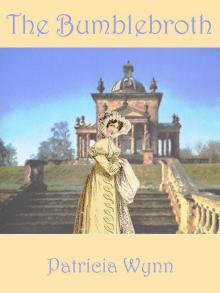 The Bumblebroth
The Bumblebroth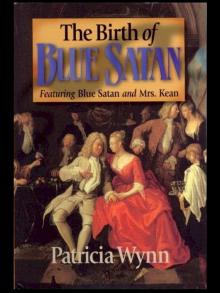 The Birth of Blue Satan
The Birth of Blue Satan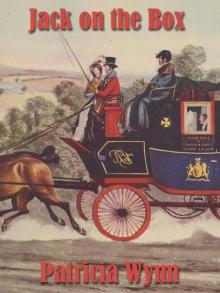 Jack on the Box
Jack on the Box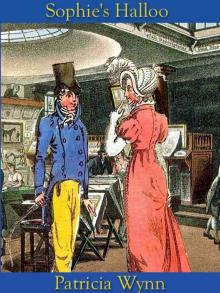 Sophie's Halloo
Sophie's Halloo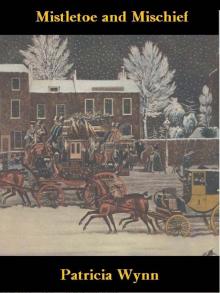 Mistletoe and Mischief
Mistletoe and Mischief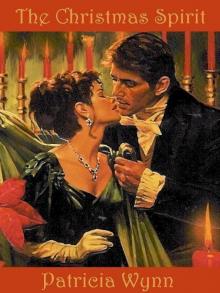 The Christmas Spirit
The Christmas Spirit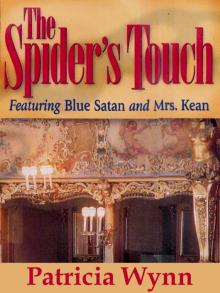 The Spider's Touch
The Spider's Touch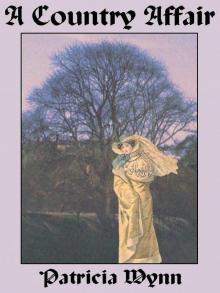 A Country Affair
A Country Affair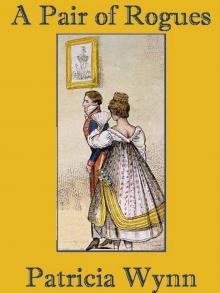 A Pair of Rogues
A Pair of Rogues